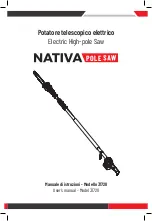
www.scheppach.com
GB | 29
c) Avoid starting the power tool unintentional-
ly. Make sure that the power tool is switched
off before you connect it to the mains and/or
insert a battery, pick it up or carry it.
lf you
have your finger on the switch when you carry
the power tool, or if the machine is switched on
when you connect it to the mains, this may result
in accidents.
d) Remove adjustment tools or wrenches before
switching on the power tool.
Tools or wrenches
in rotating machine parts may cause injury.
e) Avoid abnormal body positions.
Stand securely and keep your balance at all
times.
By doing so, you can control the power
tool more easily in unexpected situations.
f)
Wear suitable clothing. Do not wear loose
clothing or jewellery. Keep your hair, clothing
and gloves away from moving parts.
Loose
clothing, jewellery or long hair may be trapped in
moving parts.
g) lf dust extraction tools or collection bins can
optionally be attached, you must make sure
that they are connected and correctly used.
Using dust extraction tools may reduce risks
caused by dust.
h) Do not let familiarity gained from frequent
use of the tool allow you to become com-
placent and ignore tool safety principles.
A
careless action can cause severe injury within a
fraction of a second.
Use and treatment of the power tool
a) Do not overload the tool.
Use the appropriate
power tool for your type of work. With appropriate
power tools, you can work better and more safely
within the given power range.
b) Do not use the power tool if the switch does
not turn it on and off. Any power tool that can
-
not be controlled with the switch is danger-
ous and must be repaired.
c) Disconnect the plug from the power source
and/or remove the battery pack, if detacha-
ble, from the power tool before making any
adjustments, changing accessories, or stor-
ing power tools.
This preventive safety measure
reduces the risk of starting the power tool acci-
dentally.
Electric safety
a)
The plug of the power tool must fit into the
socket.
Do not modify the plug in any way. Do not
use adapter plugs together with grounded power
tools. Unmodified plugs and matching sockets re
-
duce the risk of electric shock.
b) Avoid body contact with grounded surfaces
such as pipes, radiators, ovens and refriger-
ators. There is an increased risk of electric
shock if your body is grounded.
c) Keep power tools away from rain or humidi-
ty.
Water permeation into the power tool will in-
crease the risk of electric shock.
d) Use the cable solely for its intended pur-
pose. Do not use the cable to carry or hang
up the power tool or to pull out the plug from
the socket.
Keep the cable away from heat, oil,
sharp edges or moving machine parts. Damaged
or twisted cables increase the risk of electric
shock.
e) When working outdoors with power tools,
only use extension cords which are suited for
outdoor areas.
Using extension cords suited for
outdoor applications reduces the risk of electric
shock.
f)
lf the operation of power tools in a humid en-
vironment cannot be avoided, you must use
a residual current circuit breaker.
The use of
a residual current circuit breaker will reduce the
risk of electric shock.
Personal safety
a) Pay attention to what you are doing and use
power tools sensibly.
Do not use power tools when you are tired or
under the influence of drugs, alcohol or med
-
ication.
A single moment of inattention while us-
ing power tools may cause severe injury.
b) Wear personal protective equipment and
safety goggles.
Wearing personal protective
equipment such as a dust mask, non-skid safety
boots, a protective helmet or hearing protection
according to the type and application of the pow-
er tool reduces the risk of injury.
Содержание 5901215903
Страница 4: ...www scheppach com 4 10 11 12 6 B 4 4 7 7 14 14 14 max 8 mm 13 14 24 24a 25 5a 16 30 15 5 29 34 28 C...
Страница 5: ...www scheppach com 5 17 31 6 21 22 17 20 E E E 18 33 19 32 32a 32b 32b...
Страница 124: ...www scheppach com 124...
Страница 125: ...www scheppach com 125...
Страница 126: ...www scheppach com 126...
















































